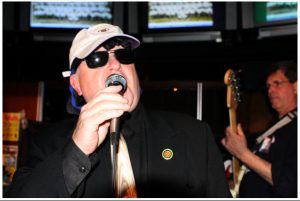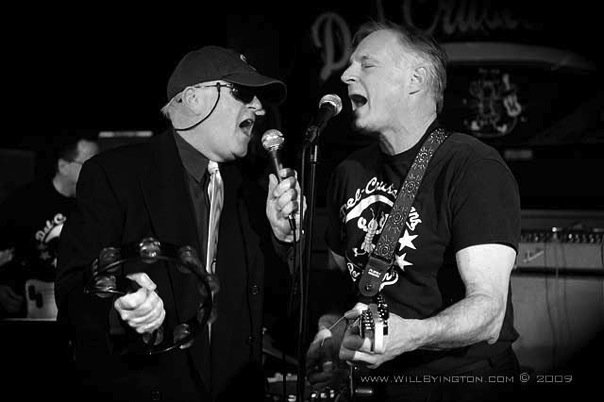Long before he became Dr. Johnson, a marketing professor at Fordham University, he was harmonizing at Northwestern’s fraternity parties and waiting for a draft letter from the U.S. Army.
“I graduated from Weinberg (formerly CAS) as an undergrad with a major in Economics in June of 1971,” Peter Johnson said. “And you may have heard from people that in those days, for young men, there was a military draft, I had a low lottery number, so I was almost certain I’d be called into service.”
But the letter that came wasn’t a draft notice — it was a reclassification.
“The local draft board had filled its quota,” he said. “So there I am with no career plans.”
That unexpected twist led him back to Northwestern. A couple of his fraternity brothers had gone to graduate school at Medill to study advertising — what is now known as the Integrated Marketing Communications program.
“One of them had a very good job at a Chicago ad agency, and I said, ‘Well, one more year of school, I can get myself teed up and go into marketing.’”
Johnson earned his Master of Science in Journalism in 1972, launching a career that would take him from big banks in Chicago to agencies on Madison Avenue, and eventually to Silicon Valley. And somewhere along the way, he also became a frontman in a rock band that’s been playing for more than 50 years.
Early in his career, Johnson focused on advertising and business development, working at major ad agencies and eventually riding the first wave of the internet boom.
“In 1995, a former boss of mine called me and said, ‘We just acquired an agency out in Silicon Valley, it’s all gonna be based on the internet.’ And I said, ‘What’s that?’”
A week later, during a trip to Mountain View, California, he was introduced to the pioneers of the web’s earliest days.
“It was just amazing. I said, ‘This is the next big thing. Sign me up,’” Johnson said. “Six months later, the firm was landing million-dollar accounts.”
But as his business profile grew, so did a side passion — teaching. It started with a guest lecture at Pace University and quickly snowballed.
“I found I was spending so much time preparing for teaching that I was ignoring my day job,” Johnson said. “I brought that concern to a psychologist. I said, ‘I feel guilty. I’m spending more time teaching than on my job. It’s just so easy.’ And he said, ‘Well, do you think everybody finds teaching easy? That’s because you’re good at it.”
It was a revelation. From then on, Johnson knew he had to teach at a university.
At 57, he took the GRE, applied to a doctoral program at Pace University, and eventually earned his PhD. Today, he teaches in the marketing department at Fordham University’s Gabelli School of Business, where he specializes in services marketing.
“Services are actually different than products,” he said. “They’re intangible. You can’t really evaluate a service until you actually experience it — whether it’s renting a car or attending a university. So marketing services tend to be very challenging.”
He teaches core courses like marketing principles, customer-driven marketing, and purpose-driven marketing, as well as an MBA-level services marketing course. And yes, he still draws on lessons from Medill.
“There’s a skill I learned at Medill in the IMC program that I use in my teaching and used throughout my business career,” Johnson said. “That’s understanding the hierarchy of objectives: What do you want to accomplish? How do you accomplish it? What strategies do you use? That three-tiered approach has stayed with me my entire career.”
Another Medill takeaway: creativity.
“We don’t teach enough of it,” he said. “Coming up with something that is indeed new, different, but also fits the brand and message. I’ve done research on whether creativity can be taught.”
And just like in business or teaching, performance is a recurring theme.
In 1971, while still in grad school, he lived in a rented house on Asbury Street in Evanston, where he heard music drifting through the walls. “I was friends with Rick Telander, a football player and a very accomplished guy,” he said. “I would come to the band rehearsals and just sort of sing along.”
With experience in a high school a cappella group, he had a good ear.
“I could sing harmony, which many in the band could not do. So I would come in and harmonize on the leads and choruses. It added a little depth.”
His role then evolved into something bigger.
“A lot of what I do with the band is perform—dance, play the tambourine, add energy to the performance. And that’s been really fun.”
As an article Telander wrote for the Chicago Magazine says, the band, Del-Crustaceans, has played at “countless weddings, including all our own. We’ve played in garages, in backyards, in tents, in seedy hillbilly bars, in swinging hipster bars, on a barge in Manhattan’s East River, in the lobby of a bank in a downtown high-rise, and at more country clubs than you can name. We’ve played at the Shedd Aquarium, Wrigley Field, Navy Pier’s Grand Ballroom, the Playboy Club in Lake Geneva, the Playboy Mansion on the Gold Coast,” and many more places they can’t recall anymore. Telander and Johnson are the only original members remaining, but the band continues to perform today, albeit less frequently.

“We started out playing fraternity parties. This was before DJs—if you wanted music at a party, you hired a band,” he said. “We were never in it for the money. It was always in it because it was just so much fun.”
And it wasn’t just fun—it shaped how he approached his career.
“I remember one time we played a Northwestern reunion at Norris,” Johnson said. “My boss was in the audience. After the show, he said, ‘I’m seeing a whole different side of you. I wish you brought that to work.’”
That stuck with Johnson.
“Sometimes we have our work face on and don’t always feel we can express joy or emotion. The band helped me realize that’s okay to do,” he said
To students graduating from Medill today, he offers some advice: keep your creativity close.
“You don’t have to be Picasso,” he said. “But there’s a process for creative thinking, and that can be taught.”
Ultimately, the thread connecting his life—from advertising to academia to the stage—is simple: joy.
“We’ve formed our own musical enterprise that’s not based around money or even fame. As Rick wrote in the article, it’s really based around fun.”
